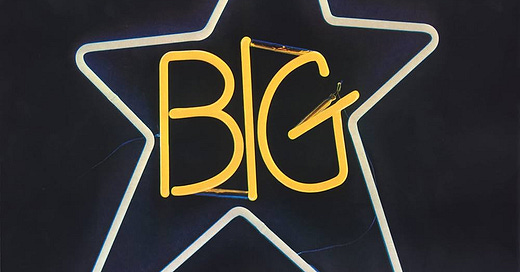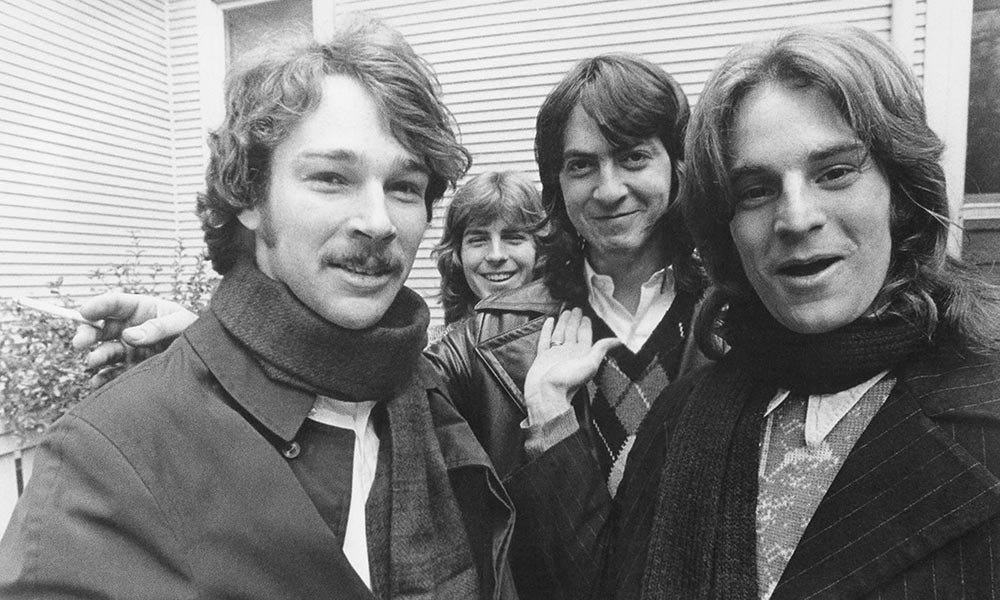The other day I saw a post that said that Pearl Harbor was closer in time to the start of MTV than we are now, and when I thought about, I saw that it was true. There's 40 years between Pearl Harbor and the beginning of MTV, and it’s now 43 years past that. Meanwhile, it's been 50 years since "Radio City," Big Star's second record, was released, and so I went to see it performed in its entirety by a quintet which only had one original member, the drummer, Jody Stephens.
You could call it a cover band of sorts, but because Big Star's high status in the music world and their far too short band life – the 3 other original members all died too young -- makes it so that I'm pretty sure no one in the audience had seen the original band - except Stephens himself, I guess. Maybe someone had? But for the most part this was an audience of second and third and fourth generation fans, who had come by their knowledge of the band via R.E.M (whose bassist, Mike Mills, is a member of the quintet) or the Replacements, whose song "Alex Chilton" helped revitalize the bands reputation, or I don't know how else. Maybe Spotify? Anyway, there we all were, Big Stars’ biggest fans, pressed up against the stage to worship at its shrine – albeit a sonic shrine, not a real one, because as I said, this isn’t the band, it’s a tribute to it.

Big Star Quintet was in town to play all of “Radio City” at the Hardly Strictly Bluegrass Festival; this pre-show gig had been scheduled for Friday night of the festival until Jack White came to town and bumped them off the stage. (White's been going around playing surprise shows at little clubs, no doubt for one million dollars per ticket). This gig was sold out too, albeit not in a Jack White-y way - and like the White gig, was cursed to occur on one of the two hottest nights San Francisco has ever experienced.
Typically, SF cools down at night, even on its hottest nights, but on this night, at 8 PM it was still so hot that we were forewarned before going in that it would be a huge sweat box. Though it's weird to be in a sweat box at a club in San Francisco, it isn't anywhere else: if you've ever been to a gig in Austin or Madrid, it's not a new sensation. The only thing that made this sweat box more uncomfortable than most was that the singer, Jon Auer, was wearing a woolly watch cap, which I desperately wanted to snatch off his head the entire time they played. It made my head itch just looking at it.
Be that as it may, there is no question that everyone at the Great American the other night was having an out-of-body experience – including the band members. That’s what Big Star music does to people: it turns us into haints. I say that because I've been reading a lot about spiritualists lately: there was a craze for them during WWI because so many people had lost their sons and loved ones. Many people at that time cashed in by becoming Tyler Henry-type psychics, causing a long-running debate about whether they were cruel charlatans taking advantage of people's grief, or psychologically sound healers, helping people accept their losses. I don't know the answer to that, but I do know that the Great American Music Hall was full of ghosts on Saturday, and not just the spirits of Alex Chilton, Andy Hummel and Chris Bell, the departed members of the original outfit. I think all of us were haunted, by, as Sinead O’ Connor has sung, the ghost of love – not just of music, but of a type of experience of music that just doesn’t quite translate to the modern age
I mean I know the kids like music now, but because of the demise of radio and records, I just don't think music works quite the same way on people today as it did then. There’s no longing in it now, no anticipation, nothing is withheld, or unavailable or inaccessible, you don’t have to wait for it, it’s all just there for you to take. You never have to just imagine it, and thus, it's not quite as central to the experience of living - despite the advent of earbuds, which argues otherwise. I can't explain why, something something something new technology, but I just think that the way that music gets into us is different, and therefore its role in our imagination is different too. But for everyone at that show on Saturday, “Radio City” got into our heads the same old-fashioned way. And it speaks, or rather, haunts us, in the same way, and its evocation by these five players - for whom it speaks even louder, you could tell - was reverent, pious, exciting, fun.
For some people reading this right now, the name Big Star might be unfamiliar. And the music might be too. You might have heard some Big Star via the opening music of the TV show "That Seventies Show," which uses their song "In the Streets," but otherwise, probably not. According to Wikipedia, Big Star is the "quintessential American power pop band -- one of the most mythic and influential cult acts in all of rock & roll…(whose) seminal body of work that never stopped inspiring succeeding generations." But for younger people I think it's difficult to understand the hallowed place they hold amongst a certain generation of indie-rock lovers. I myself fell under their sway when I first started working at a college radio station, in the late 80s and it's weird for me to realize now that wasn’t that long after their initial release. Chilton had been the lead singer of the band the Box Tops ("The Letter") and THAT really felt like oldies music to me, like what my mom listened to or something.
But what I didn’t know was that Alex was only 16 at that time and in 1974, when he was making Radio City, he was only 24. I first heard it when I was younger than that, and now, listening to Big Star's music reminds me that time: of lying on my bed at my childhood home, in the period just after college when I didn’t know what I was going to do with my life yet. My bedroom room in that house was a sun porch on the second floor of a craftsman, with redwood beams three sides made of windows, so lying on my bed meant I was being loomed over by the trees outside – also redwoods - with light glancing in through those panes. I would lie on my bed for hours, and listen to records, and dream about the books I wanted to write and the boys I wanted to like me, and all the other stuff that you think about at that age - not stuff to do with money, but stuff to do with life’s deepest longings, and Big Star is the soundtrack for that for me.
It was a time that felt like it would take forever to get through, but in fact, the time flew. Anyway, a whole lot has happened since then, both in my life and in every single one of their fans, and not just the deaths of three of the band members, or the invention – and demise -- of MTV. Indeed, so much has happened personally it doesn’t bear thinking about, but Big Star’s music still feels timeless to me, it is imprinted somewhere on my DNA, such that a profound love it will probably be passed on epi-genetically to my children’s children, or at least I hope it will.
Do you know what I mean? There is just a certain kind of music that goes into us not through the ears or the mind, but through the veins and the skin, such that sometimes when you're listening to it, the world shimmers and you actually become the band. Your memories suddenly become their memories, and it's a ghastly hot day in Memphis and you're walking to the local pool, and you have this little transistor radio that you're listening to the Rolling Stones on, or you're sitting the back of a friend's car and music's so loud, you can't say a thing…and so on.
And then time shimmers again and you're back in California, lying in your bedroom, where it's cool and golden and very different from the deep south, but I wouldn't be surprised if I ever do go to Memphis, if the smell of the air won't be as wholly familiar to me as the smell of it in my redwood-lined bedroom. Because I lived there in my mind in a way that I can’t quite explain.






